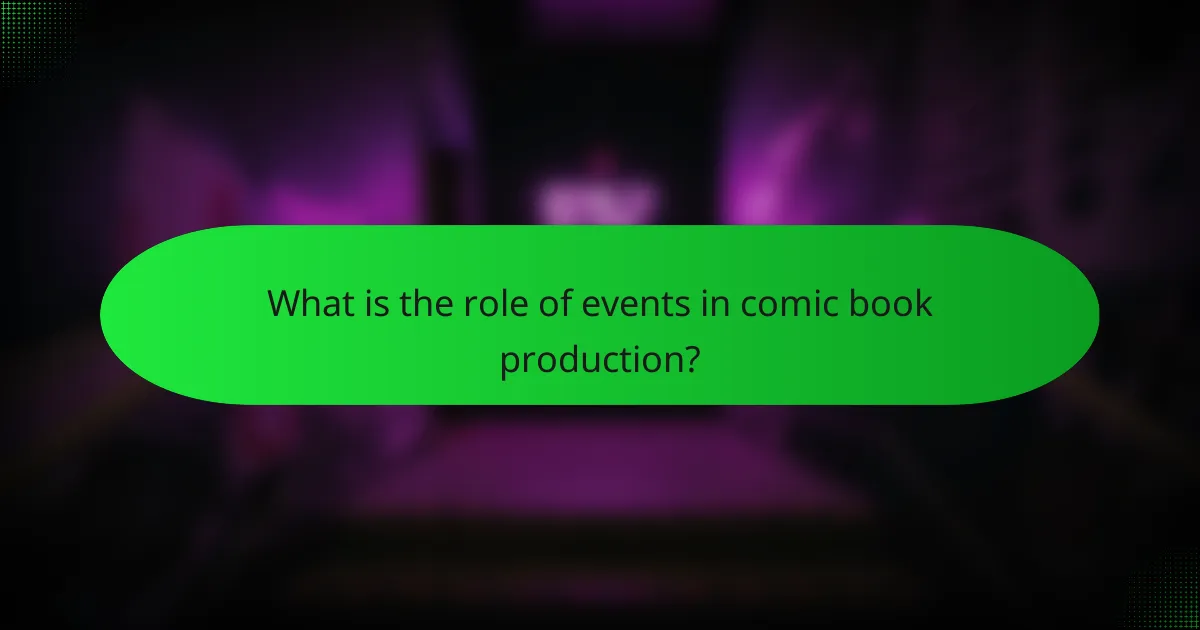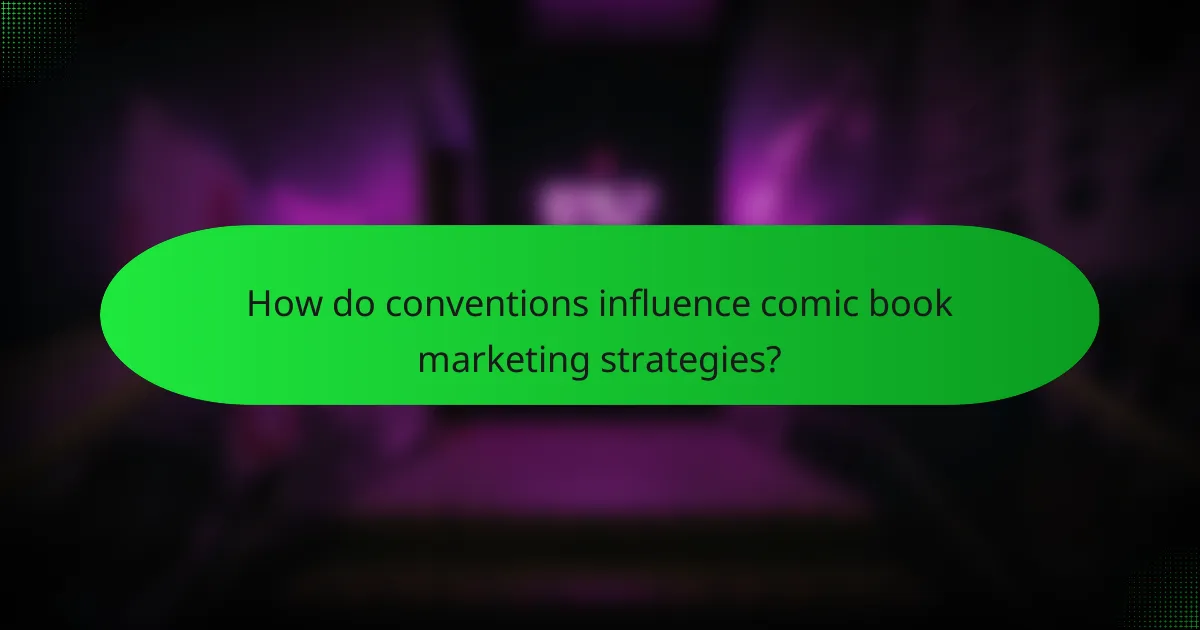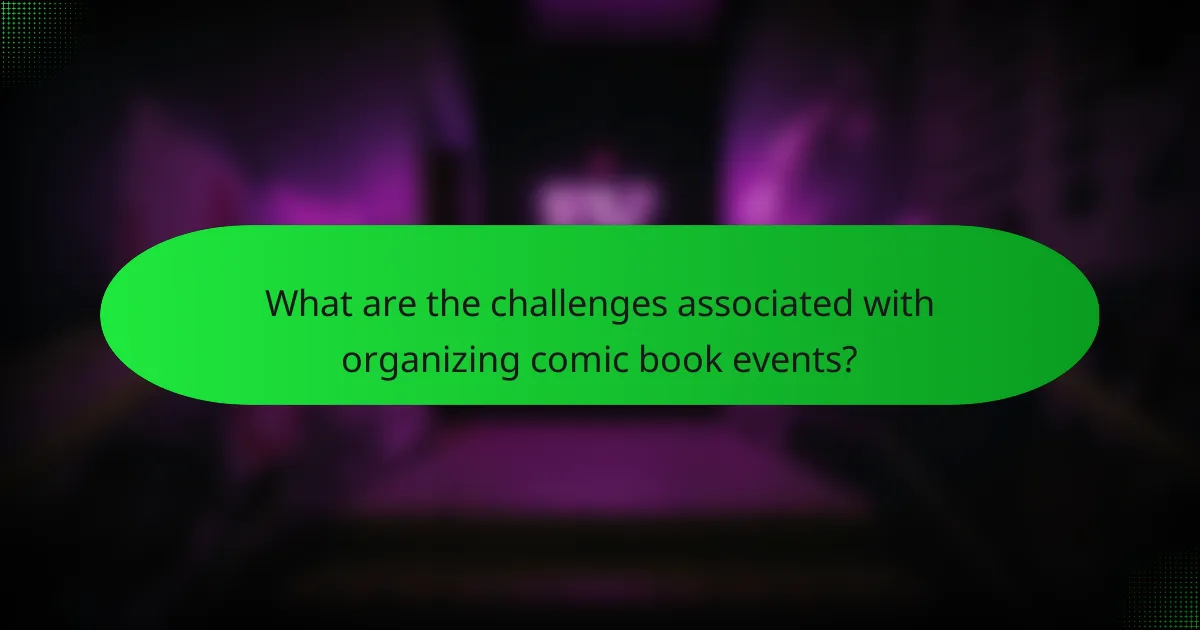Events, particularly comic conventions and signings, are pivotal in the comic book production process, enhancing direct interaction between creators and fans. These gatherings provide platforms for showcasing new titles, promoting upcoming projects, and fostering community engagement. They also play a significant role in marketing strategies, as exclusive content and promotional merchandise are often offered, leading to increased sales and media coverage. However, organizing such events presents challenges, including securing suitable venues, coordinating with multiple stakeholders, and managing logistics to ensure attendee safety. Overall, events are essential for building brand loyalty and cultural relevance within the comic book industry.

What is the role of events in comic book production?
Events play a crucial role in comic book production by facilitating direct interaction between creators and fans. They provide opportunities for creators to showcase their work and engage with their audience. Comic conventions often serve as platforms for launching new titles and promoting upcoming projects. Signings at these events allow fans to meet artists and writers, fostering a sense of community. Additionally, events can generate media coverage, increasing visibility for both the creators and their works. The social aspect of events enhances fan loyalty and encourages word-of-mouth promotion. Overall, events contribute significantly to the marketing and cultural relevance of comic books.
How do conventions and signings contribute to comic book production?
Conventions and signings significantly enhance comic book production by fostering direct engagement between creators and fans. These events provide a platform for artists and writers to showcase their work. They also allow for real-time feedback from audiences, which can influence future projects. Networking opportunities are abundant at conventions, connecting creators with publishers and industry professionals. Signings create a personal connection with fans, driving sales and interest in new titles. Events often feature panels that discuss trends and innovations in the comic book industry. This exchange of ideas can inspire new storylines and artistic directions. Overall, conventions and signings play a crucial role in shaping the comic book landscape.
What types of events are most common in the comic book industry?
Common events in the comic book industry include conventions, signings, and launch parties. Conventions like San Diego Comic-Con attract thousands of fans and creators. They feature panels, workshops, and merchandise. Signings allow fans to meet artists and writers. Launch parties celebrate new comic releases with special editions and giveaways. Additionally, festivals showcase indie comics and promote new talent. These events foster community and engagement among fans and creators. Statistics show that conventions significantly boost sales and visibility for publishers.
How do these events enhance the production process?
Events enhance the production process by fostering collaboration among creators. They provide a platform for networking, allowing artists, writers, and publishers to share ideas. This exchange can lead to innovative concepts and improved storytelling techniques. Additionally, events offer direct feedback from fans, which can guide creative decisions. Engaging with the audience helps creators understand market demands. This insight can lead to more targeted and successful productions. Furthermore, events increase visibility for upcoming projects, generating buzz and anticipation. Ultimately, these interactions contribute to a more dynamic and responsive production environment.
Why are events important for building engagement with fans?
Events are crucial for building engagement with fans. They provide opportunities for direct interaction between creators and audiences. Fans can meet their favorite artists and writers in person. This personal connection fosters loyalty and a sense of community. Events often include panels and discussions that deepen fans’ understanding of the comic book industry. According to a study by the Comic Book Legal Defense Fund, 85% of fans feel more connected to creators after attending events. Additionally, merchandise sales during events can significantly boost revenue for creators. Overall, events create memorable experiences that enhance fan engagement and strengthen the comic book community.
How do events facilitate direct interaction between creators and fans?
Events facilitate direct interaction between creators and fans by providing a physical space for engagement. These gatherings, such as conventions and signings, allow fans to meet creators face-to-face. Fans can ask questions, share feedback, and express appreciation directly to the creators. This interaction fosters a sense of community and connection. Events also enable creators to gain insights into fan preferences and trends. For example, surveys from conventions show that 80% of attendees feel more connected to creators after personal interactions. Such experiences enhance loyalty and support for the creators’ work.
What impact do events have on fan loyalty and community building?
Events significantly enhance fan loyalty and community building. They create opportunities for fans to connect with each other and with creators. This interaction fosters a sense of belonging among attendees. Events like comic conventions allow fans to share their interests and experiences. Engaging activities, such as panels and signings, deepen fans’ emotional investment. Research shows that 70% of attendees feel more loyal to brands after participating in events. Events also provide exclusive content and experiences that fans cannot access elsewhere. This exclusivity strengthens their connection to the community. Overall, events serve as vital platforms for cultivating lasting relationships among fans and creators.

How do conventions influence comic book marketing strategies?
Conventions significantly influence comic book marketing strategies by providing platforms for direct engagement with fans. They allow publishers and creators to showcase new titles and exclusive content. These events create opportunities for networking with industry professionals and other creators. Marketing strategies often include promotional merchandise and limited editions available only at conventions. Data shows that sales can spike during and after major conventions like San Diego Comic-Con. Additionally, panels and discussions at conventions help generate buzz and media coverage. Social media engagement often increases around convention time, amplifying marketing efforts. Overall, conventions serve as vital venues for building brand loyalty and community around comic book properties.
What marketing opportunities do conventions provide for comic book creators?
Conventions provide significant marketing opportunities for comic book creators. They allow creators to showcase their work directly to fans. This face-to-face interaction fosters personal connections. Creators can sell their comics and merchandise on-site. This direct sales channel can boost revenue. Conventions also facilitate networking with industry professionals. This can lead to collaborations and publishing deals. Additionally, creators gain visibility through panels and presentations. Such exposure can attract new readers and followers. Overall, conventions serve as vital platforms for promoting comic book projects.
How can creators leverage conventions to promote their work?
Creators can leverage conventions to promote their work by engaging directly with fans. They can showcase their projects through panels and presentations. Additionally, creators can sell merchandise and signed copies at their booths. Networking with industry professionals can lead to collaboration opportunities. Social media can amplify their presence by sharing live updates and behind-the-scenes content. Engaging in discussions can foster community interest and loyalty. According to a study by Eventbrite, 78% of attendees feel more connected to brands after attending events. This statistic highlights the effectiveness of conventions in building lasting relationships.
What role does merchandise play in convention marketing?
Merchandise plays a crucial role in convention marketing by enhancing brand visibility and engagement. It serves as a tangible representation of the event, attracting attendees and creating a memorable experience. Merchandise can include items like apparel, collectibles, and promotional products that resonate with fans. These products often feature popular characters or themes, fostering a connection between the audience and the brand. Research shows that 70% of convention attendees purchase merchandise, highlighting its significance in driving sales and brand loyalty. Additionally, merchandise acts as a marketing tool, extending the event’s reach beyond the convention through social media sharing. This creates ongoing engagement and interest in the brand long after the event concludes.
How do signings enhance the visibility of comic book titles?
Signings enhance the visibility of comic book titles by creating direct engagement between creators and fans. These events allow fans to interact with artists and writers, fostering a personal connection to the comic book. Signings often attract media coverage, increasing public awareness of the titles involved. Moreover, limited edition prints or exclusive merchandise at signings can drive interest and sales. Events also encourage social media sharing, amplifying the reach of the comic book. According to a survey by Comic Book Resources, 70% of fans report attending signings to meet creators. This indicates the significant impact signings have on promoting comic book titles within the community.
What are the best practices for organizing successful signings?
Successful signings require careful planning and execution. First, select a suitable venue that accommodates the expected crowd. Ensure the location is accessible to fans and has adequate facilities. Next, promote the event through social media, newsletters, and local media outlets. This increases visibility and attracts a larger audience.
Coordinate with the creators or guests to confirm their availability and preferences. Create a schedule that includes time slots for signings and interactions. Provide clear instructions for attendees on how to participate.
Prepare necessary materials, such as signage, seating, and merchandise. Ensure that there are enough staff members to assist with crowd management and logistics. Collect feedback after the event to improve future signings. Following these practices can enhance the overall experience for both fans and creators.
How do signings affect sales and readership?
Signings positively affect sales and readership. They create a direct connection between creators and fans. This interaction often leads to increased interest in the creator’s work. According to a study by the Book Industry Study Group, author signings can boost book sales by up to 40%. Fans are more likely to purchase signed copies, enhancing their personal connection to the work. Additionally, signings generate buzz through social media, further amplifying visibility. Increased visibility can lead to higher readership numbers over time. Overall, signings serve as effective marketing tools in the comic book industry.

What are the challenges associated with organizing comic book events?
Organizing comic book events presents several challenges. One significant challenge is securing a suitable venue. Venues must accommodate large crowds and provide necessary facilities. Budget constraints can limit options for high-quality spaces. Another challenge is coordinating with multiple stakeholders. This includes artists, publishers, and vendors who may have conflicting schedules. Marketing the event effectively is also crucial. Poor marketing can lead to low attendance, which impacts overall success. Additionally, managing logistics can be complex. This involves arranging transportation, setup, and breakdown of the event. Ensuring safety and security for attendees is another critical concern. Events can attract large crowds, necessitating crowd control measures. Finally, adapting to unforeseen circumstances is essential. Weather issues or last-minute cancellations can disrupt plans significantly.
What logistical considerations must be addressed for successful events?
Successful events require careful logistical planning. Key considerations include venue selection, which must accommodate expected attendees and suitable activities. Transportation arrangements are essential for participants and attendees to reach the venue efficiently. Additionally, scheduling must align with participant availability and audience interest.
Catering services should provide appropriate food and beverage options for the event duration. Technical requirements, such as audio-visual equipment, need to be assessed and arranged beforehand. Staffing is crucial for managing event operations and ensuring a smooth experience for attendees.
Finally, communication strategies must be established to inform attendees about event details and updates. These logistical elements collectively contribute to the overall success of events in the comic book production context.
How can creators and publishers effectively manage event budgets?
Creators and publishers can effectively manage event budgets by establishing a detailed budget plan. This plan should outline all expected expenses, including venue costs, travel, and promotional materials. Regularly tracking spending against the budget helps identify any discrepancies early. Utilizing cost-effective marketing strategies can also reduce expenses. Seeking sponsorships or partnerships can provide additional funding. Additionally, analyzing past event budgets can inform better decision-making for future events. According to a 2022 Event Budgeting Study, 75% of successful event planners use detailed budgeting tools to manage costs effectively.
What are common pitfalls to avoid when planning events?
Common pitfalls to avoid when planning events include inadequate budgeting, poor venue selection, and insufficient promotion. Inadequate budgeting can lead to overspending or lack of necessary resources. Poor venue selection may result in low attendance or logistical challenges. Insufficient promotion limits audience awareness and engagement. Failing to establish clear goals can lead to misaligned efforts and disappointing outcomes. Ignoring the target audience’s preferences can result in a disconnect between the event and attendees. Lastly, neglecting to have contingency plans may leave organizers unprepared for unexpected issues.
What tips can enhance the success of comic book events?
Engaging comic book events can succeed through effective planning and execution. First, identify a clear theme or focus for the event. This attracts a specific audience and creates excitement. Second, collaborate with popular creators and artists. Their presence draws fans and enhances the event’s credibility. Third, utilize social media for promotion. Platforms like Twitter and Instagram reach wider audiences and generate buzz. Fourth, offer interactive activities. Workshops, panels, and signings encourage participation and engagement. Fifth, ensure a comfortable venue. Accessibility and amenities enhance attendee experience. Sixth, gather feedback post-event. This helps improve future events based on attendee insights. These strategies are supported by industry best practices, which highlight the importance of engagement and community in comic book culture.
How can social media be utilized to promote events effectively?
Social media can be utilized to promote events effectively by creating targeted campaigns. These campaigns can reach specific demographics interested in comic books. Engaging content, such as behind-the-scenes footage and artist interviews, attracts attention. Regular updates about the event keep the audience informed and excited. Utilizing hashtags increases visibility and fosters community discussions. Collaborating with influencers can amplify reach and credibility. Live streaming events can engage remote audiences, allowing broader participation. According to a study by Eventbrite, 70% of event organizers believe social media is essential for promotion.
What strategies can improve attendee engagement during events?
Interactive activities enhance attendee engagement during events. These can include live polls, Q&A sessions, and workshops. Such activities encourage participation and foster a sense of community. Networking opportunities also play a vital role. Attendees can connect with creators and fellow fans, enhancing their experience. Personalized experiences, such as meet-and-greets, deepen emotional investment. Gamification elements, like scavenger hunts, keep attendees engaged and entertained. Providing exclusive content or sneak peeks draws interest and excitement. Evidence shows that events incorporating these strategies see higher satisfaction ratings among attendees.
The main entity of the article is events in comic book production, specifically conventions and signings. The article outlines the vital role these events play in fostering direct engagement between creators and fans, enhancing marketing strategies, and building community loyalty. It discusses various types of events, their impact on sales and readership, and best practices for organizing successful gatherings. Additionally, it highlights the logistical challenges and strategies for effective promotion, emphasizing the importance of social media in driving engagement and attendance. Overall, the article provides a comprehensive overview of how events contribute to the growth and cultural relevance of comic books.